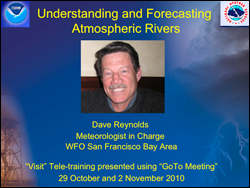
|
Atmospheric River Training Held for Forecasters
At the October HMT-West Annual Meeting, forecasters expressed interest in short and operationally-focused training sessions on Atmospheric Rivers (ARs) and related topics. The first two offerings of such training were conducted live on 29 October and 2 November by Meteorologist-In-Charge Dave Reynolds from the National Weather Service (NWS) Warning and Forecast Office at Monterey. Thirty-four attendees participated via GoTo Meeting from 12 National Weather Service offices and NOAA/NESDIS Satellite Applications Branch. Also participating were personnel from the US Naval Research Laboratory, Colorado State University and University of Wisconsin Cooperative Institutes, NASA's Short-term Prediction, Research, and Transition Center, and the NCAR Cooperative Program for Operational Meteorological Education and Training.
Participants were briefed on ARs and situational awareness for forecasters in the context of the upcoming season. Topics covered included climatology, definition of an AR, modelling capabilities, customer and partner needs for AR forecasts, collaboration with USGS on the ArkStorm Preparedness Simulation Scenario, new blended and integrated precipitable water products from ESRL/GSD's Global Positioning System GPS-Met and NOAA satellites, and operational roles and responsibilities of local, national, and regional meteorological and hydrological forecasters.
This information provides an increased awareness of AR weather patterns, the newest satellite and analysis tools, this season's teleconnections and anomalies, past experience and best practices, the importance of lead time for water-resource-related preparations and mitigation, increased collaboration with NWS National Centers' for Environmental Prediction Hydrometeorological Prediction Center and their Winter Weather (Special Operations) Desk, and the need for an AR Threat or Category Index similar to the Saffir-Simpson Scale (Category 1,2,3,4,5) used for tropical storms and hurricanes.
The sessions were recorded for future use in online learning, virtual courses, and seasonal on-station training.